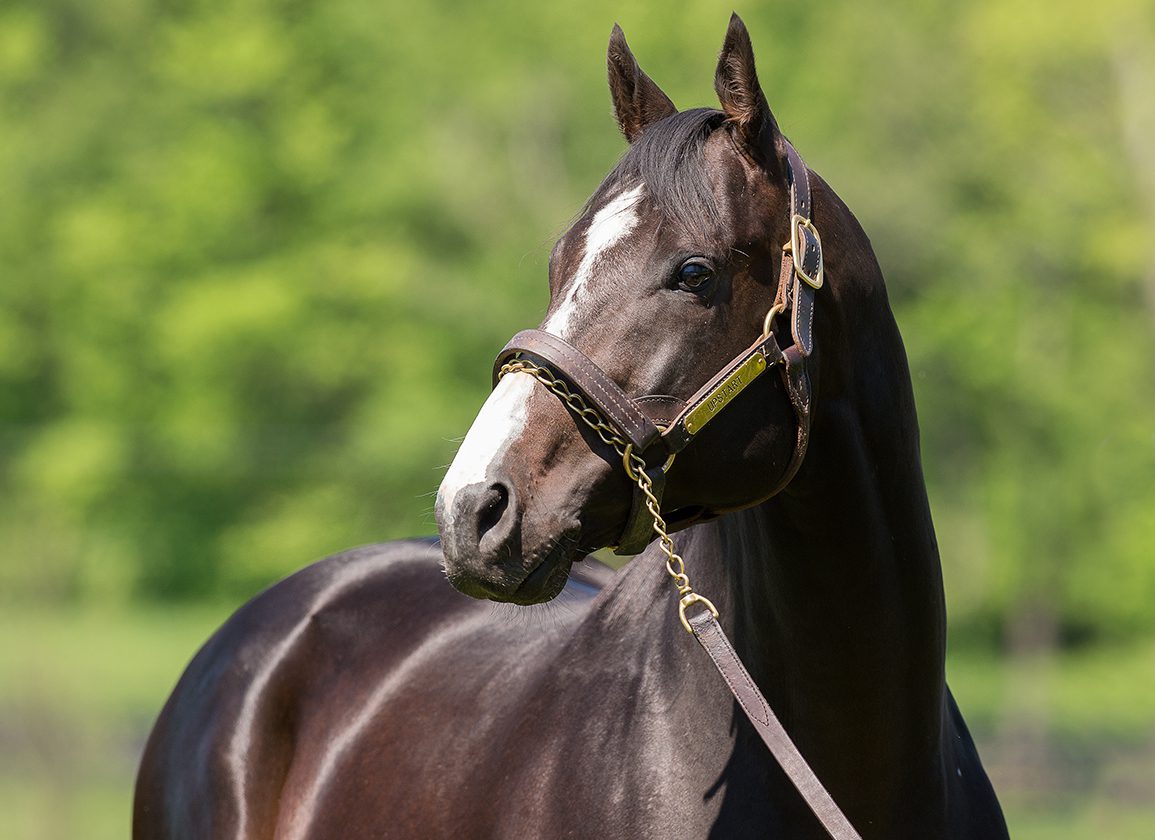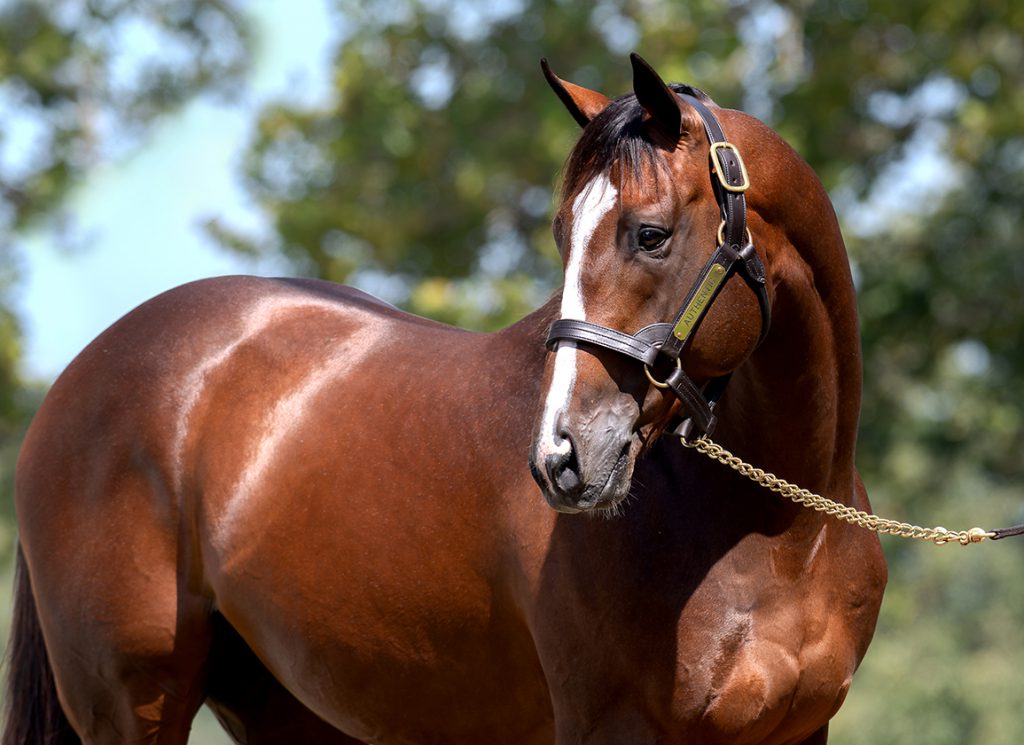By Chris McGrath
Now we're really entering nosebleed altitudes for most breeders, between $30,000 and $50,000: a zone where you should feel that you're improving the odds of coming up with an elite horse.
It tells you a lot about our business that the majority of the two dozen stallions operating at this level can only do so because they have yet to send a single runner into the starting gate. A quarter of these we immediately set to one side, as absolute beginners, because those received separate consideration in the opening instalment of this series. Of the remaining 18, another eight belong to those preceding intakes that remain untested by runners.
Some of these have been taking the precautionary clips often necessary to keep young sires in the game, as commercial breeders maintain as safe a distance as possible from the dangers that accompany racetrack exposure.
You can see that template magnified in one of the two sires who are closest to the moment of truth. AUTHENTIC started out in 2021 as the most expensive in his intake, at $75,000. This year he takes his third consecutive cut, down to $50,000 (from $60,000 and previously $70,000). Yet has he become any less likely to sire racehorses, if you send him a mare this spring, relative to when he retired as Horse of the Year? Far from it, if the market reception is any guide: he duly looked after investors by processing 91 yearlings (120 offered) at a median $235,000 (average $286,076), clear at the top of the class.
We all know how the system works. But if you genuinely thought Authentic good value at $75,000, well, you'd better get right back to him now that his fee is down by one-third. After all, a true commercial opportunist should be anticipating a rising tide from all the juvenile winners that will surely be emerging from a debut book of 229 mares, just a couple short of making him the busiest stallion in North America that year!
Of course, Spendthrift operates the model so dexterously that Authentic has meanwhile maintained demand, at his more lenient fees, with books of 202 and 198 mares. With 165 live foals to go to war, he surely gives the farm every chance of a third consecutive champion freshman.
MCKINZIE has bucked the trend by retaining his initial fee of $30,000 for a fourth year. He starred at the sales, sending no fewer than 144 into the ring-a staggering percentage of his 174 live foals. That's expressive of the commercial package he had offered in combining knockout looks with 11 triple-digit Beyers, plus Grade Is at two, three and four. He duly sold 110 at a median $90,000, reaching an average of $149,157 after blowing the doors off with a $1.2 million colt at the September Sale. (Both indices beaten only by Authentic in the class.) We've all seen market discoveries sink without trace, over the years, but McKinzie has certainly raised expectations and duly maintained numbers in the meantime, with books of 171 and 168.
The next intake is also represented by two sires, now preparing their first yearlings for auction. One of their peers, Essential Quality, actually remains beyond even this level and duly topped the weanling averages, but CHARLATAN filled second place in selling 19 of 22 at a median $175,000 and average $206,052. That was what he had to do, having similarly starting out behind only Essential Quality in terms of fee, and he's another whose original investors have been spared a depreciation: he remains $50,000 for 2024.
Charlatan emerged from the same crop and barn as Authentic to emulate the GI Arkansas Derby-GI Malibu S. double of Omaha Beach the previous year, and was only narrowly outstayed when stretching his speed again in the G1 Saudi Cup. Unfortunately he then suffered another setback, but nobody forgot his talent and he started with books of 222 and 223. Breeders evidently recalled that he had himself been a $700,000 yearling out of a genuine Grade I mare.
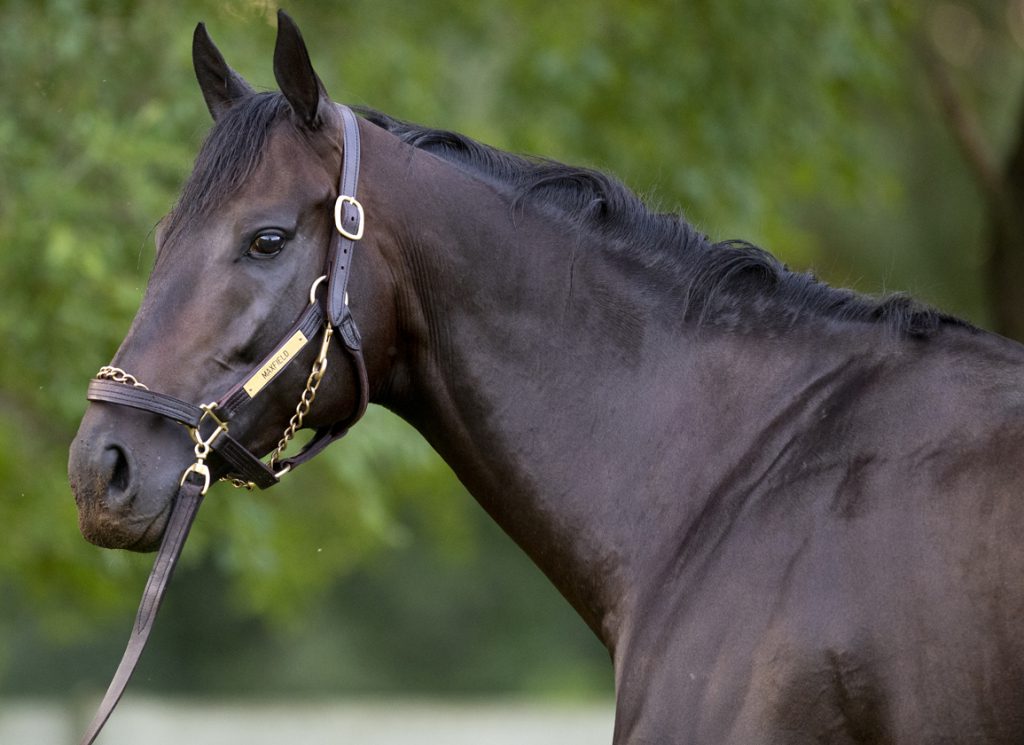
Maxfield | Sarah Andrew
MAXFIELD takes a mild trim, to $35,000 from $40,000, despite selling 11 of a dozen weanlings at a median $110,000/average $165,181. His farm tends to be more conservative with its books, so 165 mares for his first year looked like a full subscription, with another 134 in his second. Maxfield was beaten by just four horses across 11 starts, won a Grade I as a juvenile by five and a half lengths, and above all is out of a Bernardini half-sister to the admirable stallion Sky Mesa (very fine family overall).
Four youngsters who covered their first mares last spring assembled books that appeared, after the mare cap debacle, to be making a point of some kind-albeit one that may be lost on anyone who ends up with only an average specimen to bring to saturated catalogues.
With 262 partners, EPICENTER was behind only his frenzied studmate Golden Pal among American sires, his championship campaign having featured a standout GI Travers (112 Beyer). His sire has gone beyond reach, for most, and I love the sturdy European influences sowing his deeper family-though I can't imagine that those names were front and central for many others!
His neighbor JACK CHRISTOPHER was nearly as hectic with 247 mares. He must have been an easy sell, even his solitary defeat in the GI Haskell counting in his favor as confirming him to be all speed. He'd have had plenty of support had he retired on the spot after a daylight debut success at Saratoga, and beat a good one when returning for what proved his final start a year later. Both he and Epicenter take the customary trim, from $45,000 to $40,000, to help keep the door revolving.
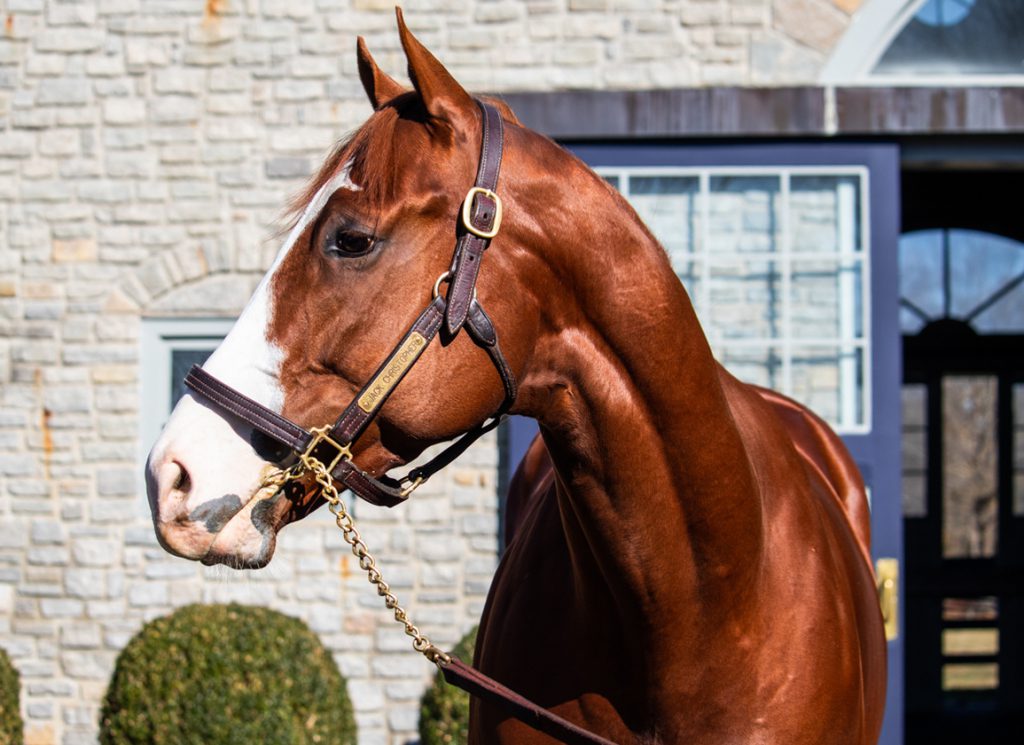
Jack Christopher | Sara Gordon
Jack Christopher represents Munnings, of course, and it's good to see some of Speightstown's later sons contesting the legacy.
Just like Charlatan, OLYMPIAD was a $700,000 yearling. His debut book of 228, making him the busiest stallion outside Ashford, shows that plenty of other farms are prepared to go all out for numbers, given the chance. He matured through the grades with eight triple-figure Beyers, but the clincher is Chic Shirine as third dam. By this stage of the series, you probably won't be surprised that proven stallions populate the Value Podium, but this guy looks a profoundly wholesome prospect in retaining a fee of $35,0000.
Though JACKIE'S WARRIOR had to settle for “just” 182 mares, he could comfort himself that they included Beholder! He's another to take a clip, to $45,000 from $50,000, but still finds himself standing for more than his own sire. Even so, he will remain in demand as a Grade I winner at Saratoga three years running, an unprecedented achievement gilded by a 28-year-old stakes record in the Hopeful.
Right, now let's get onto some sires that have actually demonstrated some competence to replicate the genetic prowess we should be looking for at this kind of fee.
Of these, the one who has barely started is OMAHA BEACH. He's just completed his freshman season with fourth place in a table dominated by Spendthrift sires, on the face of it hardly measuring up to his status as the most expensive of the quartet. But I'm not alone in retaining high hopes, judged from the fact that his fee has moved back up to $40,000 for 2024, having been allowed to slide from an opening $45,000 to $30,000.
Because while he has only had a couple of stakes winners, he has a class-high 11 black-type performers from 64 starters–a much smaller footprint than his three studmates (Vino Rosso, late bloomer though he was, has fielded 92!)–and these include four at graded stakes level. Omaha Beach presumably received rather more Classic/two-turn mares than his peers, and it's reasonable to expect consolidation from here. It's a rare horse nowadays that can win Grade Is at both six and nine furlongs, and his family overflows with quality.
Obviously, he has volume behind him, standing where he does, but that was partly a function of what seemed pretty lenient pricing throughout. His second crop of yearlings held up very well, at a median $105,000/average $156,508 for 95 sold (116 offered). That keeps Omaha Beach miles clear of his intake, some of whom have been quickly embarrassed by their opening fees. Those who kept the faith in the meantime (185 mares in his fourth book last spring) are entitled remain optimistic, the only caveat being the overall underperformance of this particular class of freshmen, judged by graded stakes winners. It's now over to Omaha Beach to convert his promise into a headliner or two.

City of Light | Lane's End
A similar remark might have been made, this time last year, about CITY OF LIGHT–and, heading into the Breeders' Cup, he had still not justified an against-the-tide hike from $40,000 to $60,000 in 2022. That was the reward for a sensational debut (average $337,698/median $260,000) at the yearling sales. With his book down to 85 last spring, from 132, he was slashed to $35,000 for 2024. But then along came Fierceness, and suddenly everything is looking much more cheerful.
City Of Light may have a few later developers, but 18 black-type performers from no more than 127 to have made the starting gate is a very fair ratio. His fee cut was among several such gestures by his farm after polarisation at the sales (where his third crop were down to a median $75,000/average $126,269 for 63 sold of 75) made it feel as though fees generally remain too high.
In his (very competitive) intake, one who has only elevated his reputation is GIRVIN, who started in Florida at $7,500 and is up to $30,000 (from $20,000) after consolidating the breakout that earned him a ticket to Kentucky. From limited materials, he is so far operating at 6 percent stakes winners (including Grade I scorer Faiza) to named foals, narrowly bettered only by Good Magic and Army Mule in his class.
Girvin's tragic sibling Midnight Bourbon showed what their unraced dam Catch the Moon must be contributing to the equation, and this year Catch the Moon's sister produced Brightwork to lend further Grade I luster to the page. Everyone should duly be fully reconciled by now to Girvin's unfashionable (but superbly-bred) sire. Those who bred to Girvin in his second year in Ocala, at $6,000, certainly can't complain about a yearling average of $92,411 (stretched by a $475,000 colt, but a $41,000 median itself very respectable) for 17 sold from 21 offered. Girvin is firmly on his way, through the roof by the restrained standards of his farm with 181 mares (up from 86) last spring, and only an even more upwardly mobile studmate has kept him off the Value Podium.
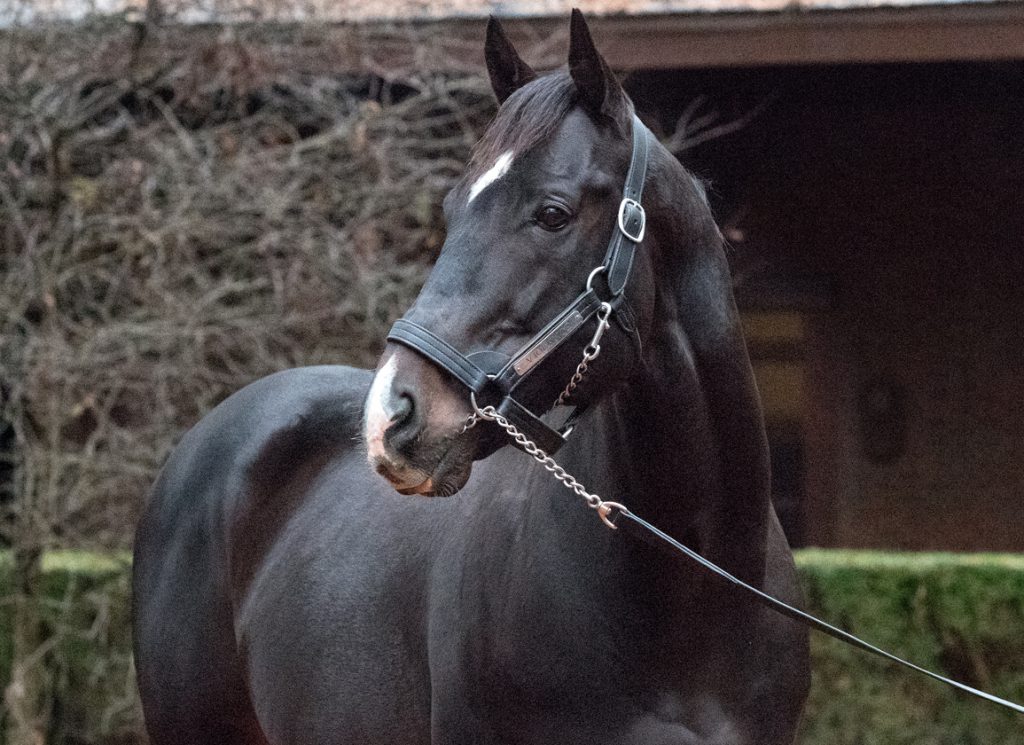
Violence | Sarah Andrew
Before we get to that, we have three horses that have by now had ample opportunity to show where they fit in the marketplace: Liam's Map, Maclean's Music and VIOLENCE.
Not that the latter has remotely settled, in terms of pricing! Initially elevated to $60,000 for 2024, he has meanwhile slipped back into this bracket at $40,000. The reasons have been cogently explained, and leave him looking big value as the sire of two new stallions in Kentucky this year, not to mention one with an obvious shot at the freshman title in Volatile. Violence is actually cheaper than his champion son Forte, a rookie whose supporters would surely be delighted if he can produce as many fast horses by the time he reaches the equivalent point of his career. Violence's book will be managed appropriately to his circumstances, but purely in terms of value he looks of imperative interest to eligible mares. For this is a proven achiever at this level–both on the track and in the ring, where he moved his yearling yield up to a median of $80,000 (from $60,000) and average $121,642 (from $97,614). That's impressive for a stallion with seven crops in play. Violence was No. 13 on the general sires' list and the caveats sound very manageable.
His studmate MACLEAN'S MUSIC also looks a fair price at $40,000, after a couple of years at $50,000, considering that he has four sons at stud in the Bluegrass. We've already noted one of them, Jackie's Warrior, getting plenty of trade at a higher fee, while Drain The Clock served no fewer than 199 mares in his debut season. Maclean's Music himself had to settle for 144 last spring, but covered 421 over the previous two seasons after dwindling to 57 in 2020, so the good old “pipeline” is well and truly loaded. In fact, no fewer than 183 live foals in 2022 give him the single biggest battalion of juveniles for the forthcoming campaign. So this looks a pretty shrewd time to stay aboard with a horse who processed as many as 104 of 131 yearlings at an average $118,739 ($70,000 median sound enough, against a $25,000 conception fee).
LIAM'S MAP also maintained his sales performance, selling 80 of 102 offered at a $100,000 median/$124,024 average–conceived at $30,000–albeit down somewhat on the previous crop, who had knocked it out of the park ($130,000/$166,724). Standing at $40,000 for a third year running, he once again proved a reliable source of stakes action this year, chiefly with maturing stock. His next task is to emulate the Hill 'n' Dale pair, who have been in the game rather longer, as a sire of sires.
VALUE PODIUM
Bronze: HARD SPUN
Danzig–Turkish Tryst (Turkoman)
Darley $35,000
So I guess he's not going to change the world, at this stage–but I really don't see much better value to prove your mare, or just to get yourself a racehorse. I know that's not everyone's priority, but the fact is that the last big son of Danzig has now turned 20 and that leaves us diminishing access to the great patriarch.

Hard Spun | Darley
Hard Spun missed a return to the top 10 sires only by cents, relatively speaking, and it was a measure of what he can do for a mare that a horse with as plain a page as Two Phil's could break into the elite of his crop, and now become Hard Spun's fourth son at stud in Kentucky.
It's incredible that a horse with a dozen domestic Grade I winners has never gone higher than $45,000 in the decade since he made the sojourn in Japan that (in hindsight) cost him vital momentum. In that time, he has finished as high as fourth in the general sires' list, but he doesn't get precocious horses and has settled at a median $67,500 (strong six-figure average) with his last couple of yearling crops.
Hard Spun nonetheless produced another 26 black-type performers in 2023, and cumulatively stands at No. 7 among active sires with several ratios (for instance, graded stakes winners/performers at 2.7/5.7 percent of named foals) uncannily in step with his old buddy Street Sense, who maintains a fee of $60,000.
It's gratifying to see that he remains fully subscribed, 151 mares last year showing that there are still plenty of breeders out there who recognise the importance not just of getting a winner under their mare, but a high-class winner. Hard Spun's stock goes on all surfaces, at all distances, and with those storied Darby Dan bloodlines behind him, it's no surprise that he should meanwhile be emerging as a broodmare influence. His daughters have lately produced a top-class miler in Europe in Alcohol Free (Ire) (No Nay Never), and no less an animal than Good Magic.
Somehow the world has spun against this horse, but it's very hard to see why.
Silver: AMERICAN PHAROAH
Pioneerof The Nile–Littleprincessemma (Yankee Gentleman)
Ashford Stud $50,000
Well, you can't win them all–even if you're Coolmore. Who could have said, for certain, which of their two Triple Crown winners would best replicate the talent that had confirmed the series to remain within the competence of a modern Thoroughbred? It was actually this one, having ended a generation of doubt, that started at the higher fee: he opened at $200,000 in 2016, and Justify at $150,000 three years later. The latter had been trimmed to $100,000 by the time he launched his first runners, in 2022; and American Pharoah had taken a proportionately deeper cut at the equivalent stage, to $110,000 for 2019. Their paths since, however, have forked radically. Justify is now out of sight, listed as private; and Pharoah enters 2024 suffering the indignity of yet another cut, this time down to $50,000 from $60,000.

American Pharoah | Sarah Andrew
Now there's no way that you can say he's any kind of dud, en route to oblivion. He finished 2023 at No. 6 in the general sires' list, with a seventh Grade I winner supplemented by no fewer than six others placed at the elite level–and that's taking no account of his success in Australia, including a G1 Victoria Derby winner. Yes, like most stallions on this farm, the volume behind him proves a double-edged sword when it comes to his ratios.
His 11 stakes winners arrived at 3.7 percent, pretty unexciting given the quality he must have been working with. But he continues to get his superior/graded action at a superior rate to ever-fashionable studmate Munnings, for instance, who commands a 50 percent higher fee.
The exotic seeding of American Pharoah's family was always liable to make the owners of top-class mares a little nervous, but his dam has proved a consistent producer so something has come together in dynamic fashion. Further action was plainly required after he assembled no more than 129 mares with last year's reduction, but if able to maintain his current sales performance–yearling median $150,000 with both his last two crops, averaging $210,164 in 2023–then you'll be looking at a very fair yield at his current price.
Both American Pharoah and Justify have proved effective sires on turf. If this fee proves a last roll of the dice, then I might impudently suggest once again that American Pharoah could be worth a spin in Co. Tipperary. But he's now within reach of a different type of American breeder, and that may well grant him a new lease of life.
Gold: UPSTART
Flatter–Party Silks (Touch Gold)
Airdrie Stud $30,000
So what is it, really, that we can hope to find at this level? I mean, we're obviously excluding “fantasy” breeding to untested stallions. But is there perhaps a horse out there hinting that he's pressing against the ceiling, and might soon be inaccessible? The other pair on the podium, admirable as they are, hardly fit that category. To me, however, Upstart is the dude in this tier who has the chance of elevating himself to a higher level yet.
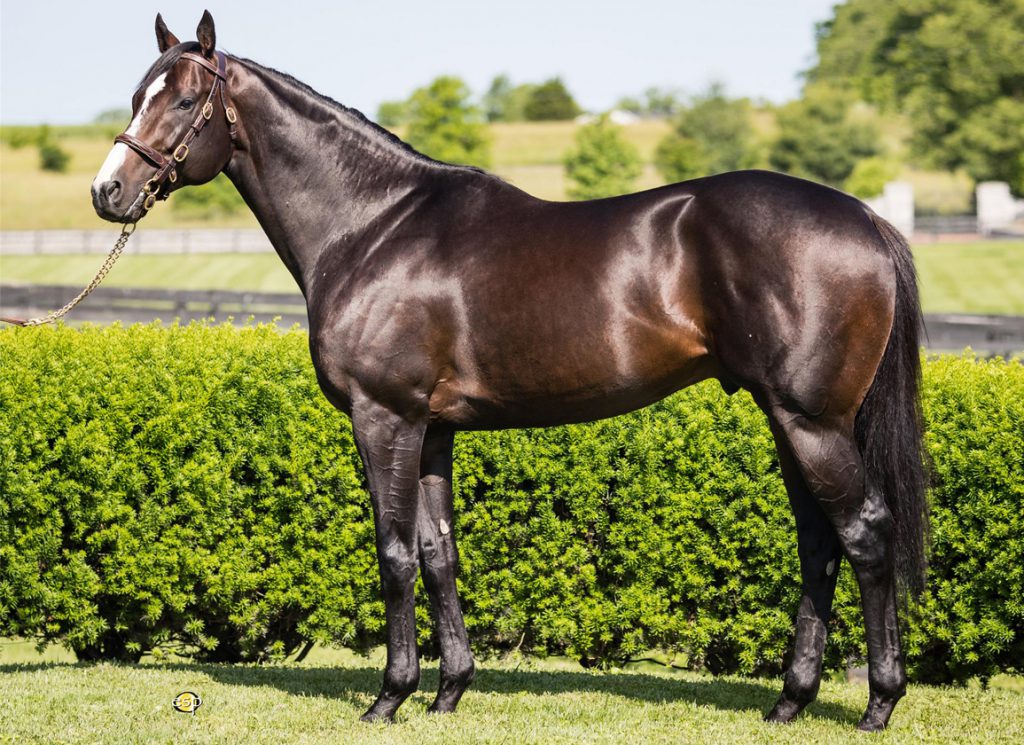
Upstart | EquiSport
Maybe you were disappointed that he didn't follow through the 2022 deeds of Zandon and Kathleen O (among 63 named foals conceived at $10,000) with his next crop of sophomores? Well, that's because his third crop comprised just 27 live foals. Even so they included Prerequisite, a $47,000-to-$350,000 pinhook who won the GII Wonder Again S. on her first start outside maiden company, and then missed a Grade I by three parts of a length next time. Meanwhile, as we knew to expect from his own template (multiple Grade I-placed in three consecutive seasons), his mature stock kept him in the game with wins in races as resonant as the GII Clark and GII Woodward S.
He has punched conspicuously above weight at the sales, averaging $90,900 in 2022, but traded at just $39,434 from a modest book last year. But he's now ready to open a new cycle. His incoming yearlings emerge from a book of 151, saturation point for a farm that resists the opportunity of exposing their clients by inundating catalogues. Hiked to $30,000 last spring, he entertained another 153. When you consider what he has been doing with mediocre materials, this is a stallion on the point of a big move.
Despite a dual Grade I runner-up among his first juveniles, Upstart somehow remained bumping along at $10,000. Even so, his 14 stakes winners at 5.2 percent of named foals and 26 black-type performers at 10.4 percent compares with 5/12.2 percent for the lavishly supported Nyquist (standing at $85,000) in his own class; 4/9 percent for Practical Joke ($45,000) and 5.2/8.5 percent for Arrogate in the following intake; 5.9/9.4 percent for Justify and 4/11.1 percent for Bolt d'Oro ($60,000) in the one after that.
This is a horse that gets stock onto the track, and into the winner's circle: 53 percent winners to lifetime starters, compared with 46 percent for the soaraway hero of his intake, Not This Time; 41 percent for Nyquist; 43 percent even for the stellar Gun Runner, the same for Practical Joke, just 39 percent for Arrogate.
Upstart was cleverly named and, it now seems, aptly too. There are some curiosities sowing his family, but it's demonstrably all working. Perhaps the farm that gave us the sires of Uncle Mo and Into Mischief has again tapped into an unexpected seam of gold. With an incoming spike in quality and quantity, catch him while you can.
Not a subscriber? Click here to sign up for the daily PDF or alerts.





